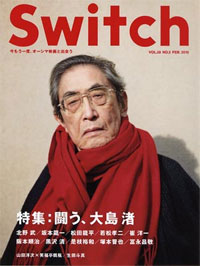Movie Directors
Oshima Nagisa
(Kyoto, 1932-2013)
 Born in Kyoto and a graduate of Kyoto University, Oshima was a leader of the leftist, Shochiku New Wave of young directors who were inspired by French cinema in the 1960's. Within the movie industry, he was always a strong supporter of the freedom of expression and a critic of the commercialism of Hollywood and Japanese cinema. In Japan, his most popular film was Night and Fog in Japan (Nihon no Yoru to Kiri, 1960), a critical look at the left-wing in Japan.
Born in Kyoto and a graduate of Kyoto University, Oshima was a leader of the leftist, Shochiku New Wave of young directors who were inspired by French cinema in the 1960's. Within the movie industry, he was always a strong supporter of the freedom of expression and a critic of the commercialism of Hollywood and Japanese cinema. In Japan, his most popular film was Night and Fog in Japan (Nihon no Yoru to Kiri, 1960), a critical look at the left-wing in Japan.
He is best known abroad for three films: the controversial French-produced In the Realm of the Senses (Ai no Korida, 1976), a study of sexual obsession based on a true story; its 1978 sequel Empire of Passion (Ai no Borei), which won the best director award at Cannes; and 1983's prisoner of war drama Merry Christmas, Mr. Lawrence.
In keeping with his criticism of censorship and the theme of the movie, Oshima insisted that In the Realm of the Senses feature unsimulated sex. For that reason, the film had to be sent to France to be processed. Japanese audiences have been unable to this day to see an uncensored version of the movie.

Merry Christmas, Mr. Lawrence was an unusual film, not only because it was a joint Japanese-British production, but its main stars were better known for their work in other fields. Sakamoto Ryuichi and David Bowie were established musical superstars with a shared taste for acting and the avant-garde, while the up-coming Kitano Takeshi was one of Japan's most irreverent comedians. Kitano, of course, would go on to become a leading movie director in his own right. Also starring British actor Tom Conti, the film was based on the novel The Seed and the Sower by Laurence Van Der Post and the music was composed by Sakamoto. It is the story of two British officers in a Japanese POW camp and the complex relationships that develop between them and their gaolers. The prisoner's battle for survival becomes a battle of contrasting philosophies and willpower as the Japanese try to break their spirit.
 The next decade saw the release of Max, Mon Amour with an all-European cast, and Oshima doing more work in Japan, including two films and regular appearances on TV variety shows. Following a stroke in 1996, he cut back his workload drastically. He returned with the period piece Taboo (Gohatto), which appeared in the Venice Film Festival in 1999 and reunited him with Kitano and Sakamoto. He suffered two further strokes which left him unable to return to film making.
The next decade saw the release of Max, Mon Amour with an all-European cast, and Oshima doing more work in Japan, including two films and regular appearances on TV variety shows. Following a stroke in 1996, he cut back his workload drastically. He returned with the period piece Taboo (Gohatto), which appeared in the Venice Film Festival in 1999 and reunited him with Kitano and Sakamoto. He suffered two further strokes which left him unable to return to film making.
Oshima died of pneumonia on January 15, 2013.
Oshima's younger sister Eiko was also a producer on several of his films, including Dear Summer Sister (Natsu no Imoto, 1972) and Taboo. She also worked with him as an actress, appearing in The Catch (Shiiku, 1961).
